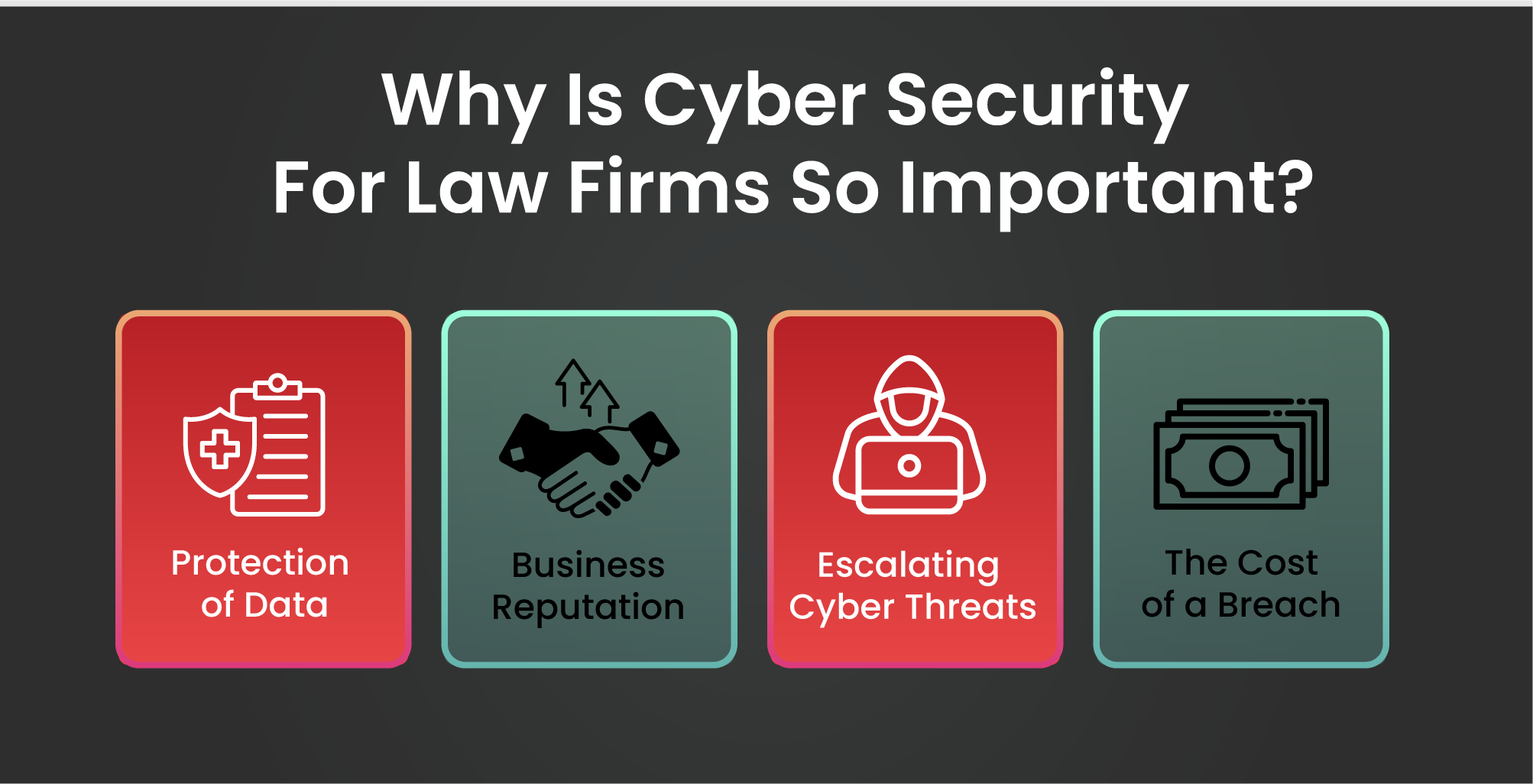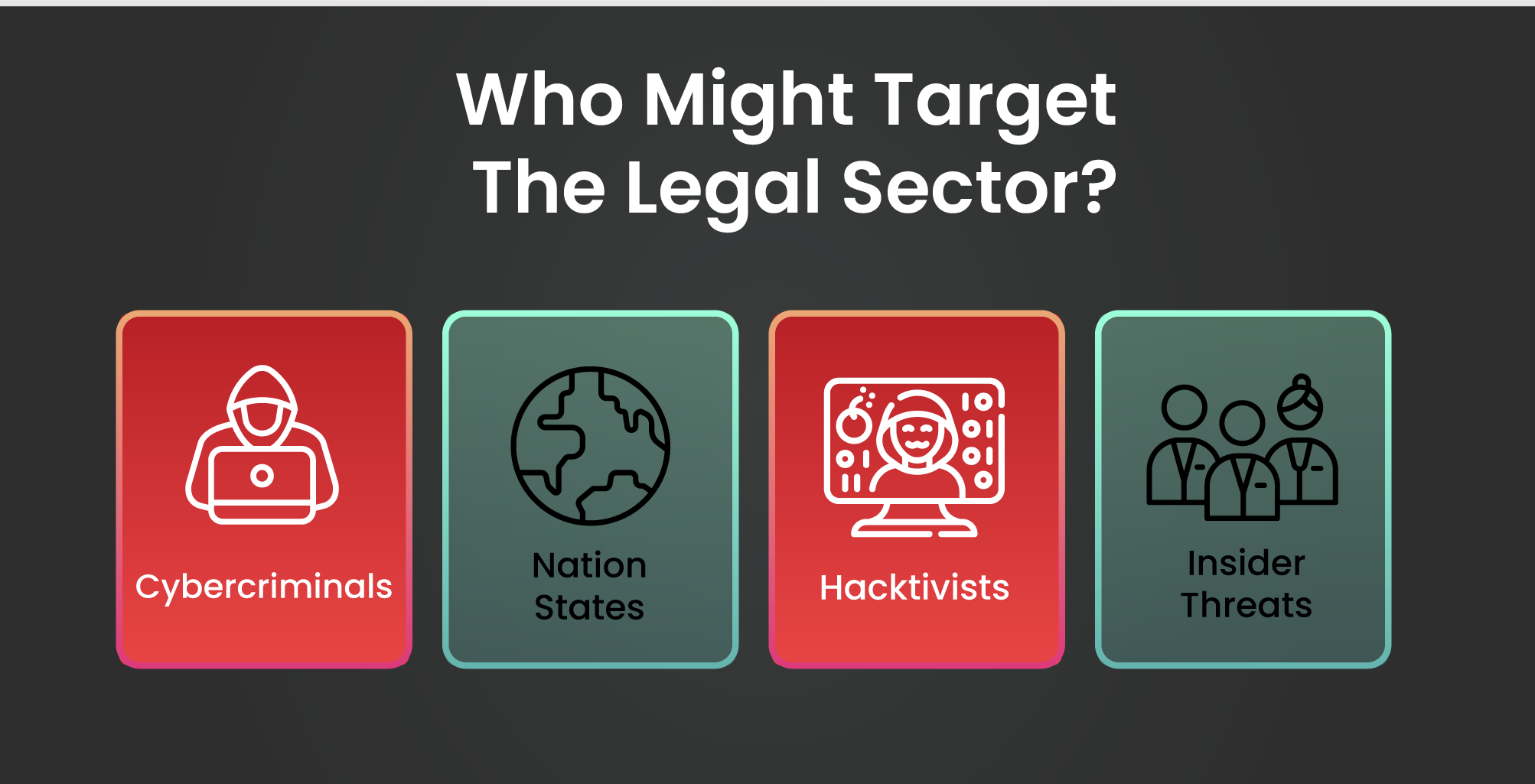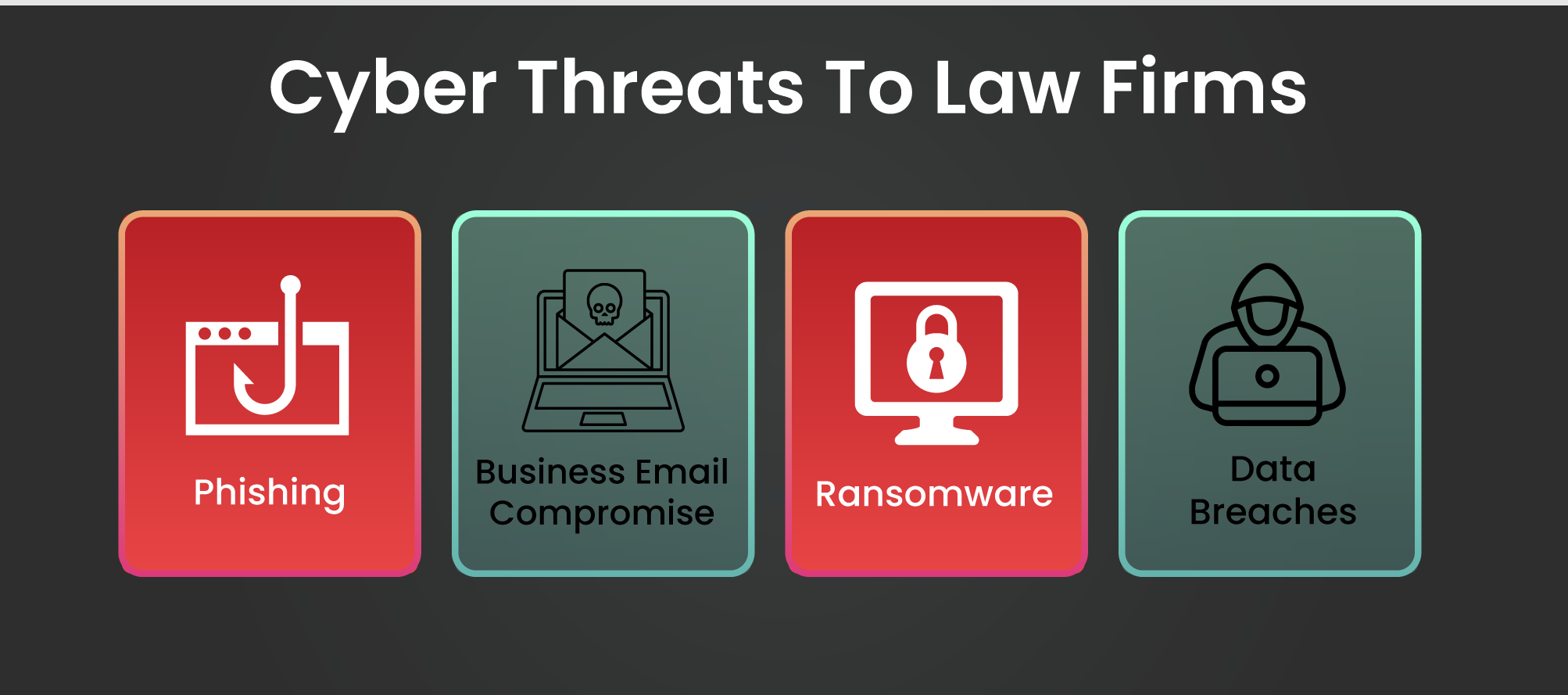Cyber Security for Law Firms: Everything You Need to Know
March 22, 2024
Cyberattacks targeting legal practices have become increasingly sophisticated and prevalent, posing significant risks to client confidentiality, firm reputation, and financial stability. Lawyers, entrusted with a wealth of sensitive information, must adhere to the core tenet of attorney-client privilege, ensuring that client data remains confidential.

While multinational corporations may invest heavily in cyber security, smaller law firms often struggle to allocate sufficient resources to this critical aspect of their operations. As a result, they become attractive targets for cybercriminals who recognise the potential value of the information they possess.
In this comprehensive article, we will explore the pressing need for cyber security for law firms. From understanding the unique vulnerabilities faced by law firms to offering practical strategies for enhancing cyber security measures, we will equip legal professionals with the knowledge and tools needed to mitigate cyber risks effectively.
Every business needs robust cyber security, but for law firms, it’s an absolute necessity. Handling highly sensitive information makes them prime targets for cyber threats and malicious attacks. Any breach of data integrity can spell disaster for a firm’s reputation and erode client trust.

As a legal professional, safeguarding your clients’ confidential data is paramount. If this information were to fall into the wrong hands, it could be used to blackmail or extort your client. This underscores the critical need for stringent cyber security protocols to shield your clients’ data from potential breaches or theft. Failure to do so could have dire consequences for your clients and your firm’s integrity.
The professional reputation of a law firm is its lifeblood, influencing client acquisition and fostering enduring relationships. As Warren Buffet famously stated, “It takes 20 years to build a reputation and 5 minutes to ruin it.” This rings especially true in today’s cyber-threat landscape, where daily assaults pose significant risks to all businesses, particularly those in the legal sector.
The frequency and sophistication of cyberattacks continue to escalate at an alarming rate. With society’s growing reliance on technology, the exposure to potential cyber threats only intensifies. Hence, robust cyber security measures are indispensable for safeguarding law firms against these evolving dangers.

Ultimately, the cost of neglecting cyber security measures is far too high for law firms. According to IBM’s Cost of a Data Breach Report 2023, the global average cost of a data breach in 2023 was $4.45 million, a 15% increase over 3 years. Given the substantial financial transactions and the sensitive nature of the information they handle, having a robust framework is non-negotiable. Without it, firms risk catastrophic losses, emphasising the indispensable role of legally managed service providers in bolstering cyber defences.
Here are the key entities that might target legal firms, aiming to steal funds, access sensitive information, or extort. These threats can manifest through direct attacks on the firm or vulnerabilities in their suppliers. Attackers may also exploit the personal devices of staff members alongside business equipment, networks, and systems.

The most significant threat to the legal sector arises from cybercriminals motivated by financial gain. Ranging from sophisticated, professional groups to small-scale fraudsters, many purchase ready-made services from experienced counterparts, eliminating the need for advanced technical skills. This shift has led to a surge in cybercrime scale, with criminals indiscriminately targeting numerous organisations using largely automated tools requiring minimal technical expertise.
Nation states engage in cyber activities to advance their national interests or disrupt professionals involved in issues contrary to their agendas. Russia, Iran, and North Korea have been identified as utilising criminal actors for state objectives, employing criminal malware techniques to raise funds and cause disruption. Major law firms are particularly vulnerable as they form part of wider supply chains used by nation states. The risk escalates for firms advising sensitive clients or operating in hostile locations. State actors, such as those from China, have utilised cyber techniques against UK institutions for intellectual property theft, posing an additional risk for firms handling intellectual property rights.
Driven by specific causes, hacktivists utilise cyber attacks to advance political or personal agendas or protest perceived injustices. The NCSC notes a growing hacktivist community targeting law firms, especially those representing organisations at odds with hacktivists’ agendas, such as those in the life sciences or energy sectors.
Insider threats, whether deliberate or accidental, pose significant security risks to organisations. Originating from employees, volunteers, contractors, or suppliers with authorised access, these threats can exploit sensitive data and finances. Insider threats aren’t always malicious and can result from a lack of staff training or cumbersome processes that inadvertently encourage staff to bypass security measures. Effective management of staff security is crucial in the legal sector, given that many staff members have access levels potentially beneficial to criminal groups.
Cyber security threats to law firms come in both direct and indirect attacks, often leaving many firms vulnerable due to outdated or unmanaged practices. Here are some of the most common cyber security threats experienced by law firms.

Phishing scams remain prevalent in the legal industry, exploiting the vast amounts of sensitive information exchanged digitally. Scammers use deceptive emails to impersonate clients, colleagues, or authority figures, directing users to phishing sites or soliciting sensitive information via email or fake e-sign documents. Protecting against such attacks requires robust password practices, avoidance of password reuse, and the use of multi-factor authentication. Prompt action by network security providers is crucial in mitigating the risk of data breaches resulting from phishing scams.
BEC is a significant threat to businesses, including law firms, where intercepted emails are exploited. Perpetrators craft convincing emails impersonating legitimate sources like clients or colleagues, often requesting money or sensitive data. Interaction with these emails risks credential theft or malware installation. BEC attacks rely on psychological manipulation, using social engineering tactics to enhance authenticity and increase compliance with demands.
Ransomware remains a significant cyber security threat, especially for law firms entrusted with sensitive client information. These attack attacks involve the installation of malicious software on devices, often through unwitting user actions, followed by threats to withhold access to systems or files unless a ransom is paid. This type of attack not only jeopardises the confidentiality and integrity of sensitive data but also disrupts the firm’s operations and potentially damages its reputation.
Law firms, given their storage and transmission of sensitive data, are at an elevated risk of data breaches. Malware, phishing attacks, hacks, or email spoofing may be employed to access sensitive client data or financial information. Preventing data leaks necessitates robust user security policies and tools, including access control, antivirus and antimalware software, communication security measures, intrusion prevention systems (IPS), and security information and event management (SIEM) solutions. These measures not only help prevent data breaches but also facilitate swift response and mitigation in case of security incidents.
Law firms face increasingly sophisticated cyber threats in today’s digital landscape. Here are ten essential steps law firms can take to bolster their cyber defences and protect sensitive client data:
Implementing strong security measures involves employing a multi-faceted approach to safeguarding your firm’s digital assets. This encompasses several key components, including the use of robust passwords, the implementation of firewalls, and the deployment of reliable antivirus software.
Maintain a comprehensive inventory of all IT equipment used within your firm, including details such as model, serial number, initial user, purchase date, scheduled disposal date, actual disposal date, and disposal method. Regularly review this register to prevent oversights and minimise the risk of a ‘shadow IT culture’ developing.
Ensure robust backup procedures are in place to safeguard against cyber threats or system failures. Regularly test your backup systems by requesting the restoration of random files from diverse locations, including media files, to verify their effectiveness.
Deploy multi-factor authentication (MFA) to enhance network security and prevent unauthorised access. MFA adds an additional layer of verification beyond passwords, enhancing protection against cyber intrusions and facilitating non-repudiation of user actions.
Differentiate between ‘admin’ and ‘user’ access privileges to limit the potential damage of cyber attacks. Grant users access only to essential software and files, reserving administrative rights for trusted IT personnel responsible for system maintenance and updates.
Minimise using personal devices for work purposes to mitigate security risks associated with BYOD practices. BYOD may compromise data security and intellectual property rights, necessitating stringent monitoring and control measures.
Utilise encryption techniques to safeguard data integrity and confidentiality across websites, devices, and files. Implement HTTPS protocols for secure website connections and deploy disk encryption software, to protect sensitive data stored on devices.
Create a customised disaster recovery plan tailored to your firm’s specific requirements and regularly practice simulated scenarios to test its effectiveness. Establish clear protocols for communication, client notification, and decision-making to ensure swift and coordinated responses in emergencies.
Regularly update software with patches provided by vendors to address vulnerabilities and defend against emerging cyber threats. Schedule updates during off-peak hours and exercise caution when implementing patches, prioritising timely installation to minimise exposure to potential attacks.
Offer regular staff training sessions to raise awareness of cyber risks and promote adherence to security policies. Conduct simulated phishing exercises to assess staff adherence to security protocols and encourage vigilance against suspicious emails and links.
As cyber threats continue to evolve and cyber criminals become increasingly sophisticated, law firms need to stay ahead of the curve in protecting their digital assets and sensitive client data. By implementing robust cyber policies and procedures, firms can strengthen their defences against potential breaches and mitigate the risk of cyber attacks.
At OneCollab, we understand the importance of proactive cyber security measures. Our team is dedicated to providing tailored solutions to help law firms bolster their cyber defences and safeguard their valuable assets. Contact us today to learn more about how we can support your firm in navigating the complex landscape of cyber threats.
Contact us to learn more about our cyber security solutions, request a consultation, or share your thoughts on our blog content. We’re here to assist you in protecting your business from evolving cyber threats.
Call us +44 20 8126 8620
Email us [email protected]
"*" indicates required fields